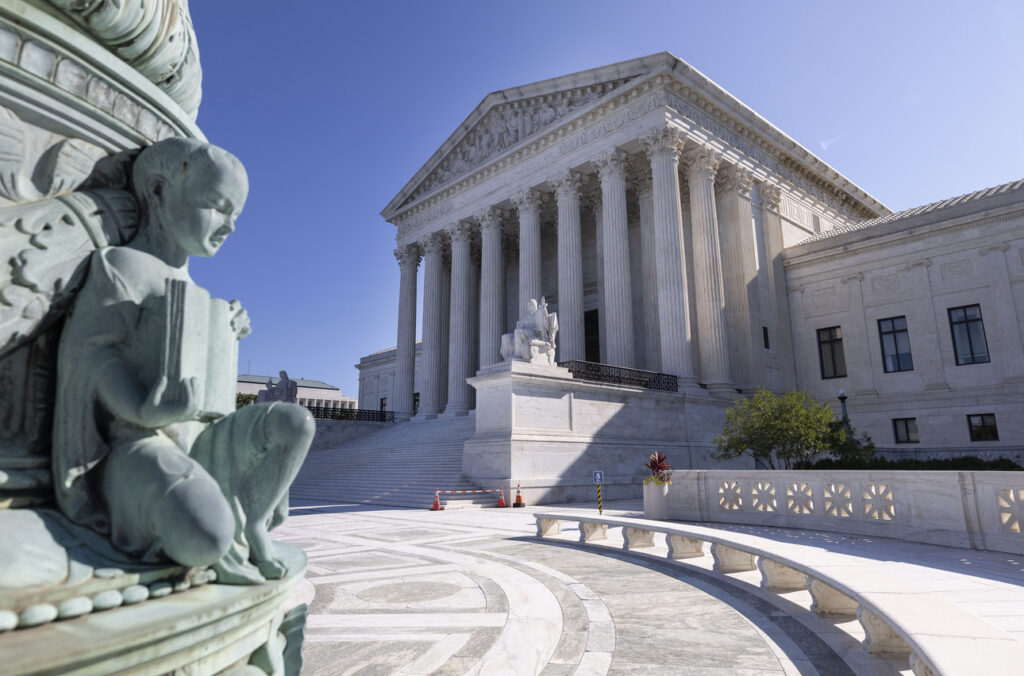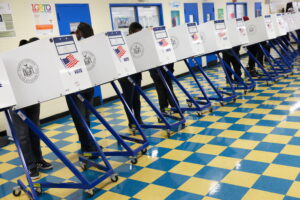
The Supreme Court has scheduled several controversial cases—including a domestic abuser gun ban and whether a critic can trademark an insult targeting former President Donald Trump—for oral argument after its new term begins on Oct. 2.
Seven cases in all were scheduled for hearing dates running from Oct. 30 through Nov. 8 by the court on Sept. 6.
Other cases involve whether Americans can sue when government officials block them on social media and a challenge to civil asset forfeiture, a policy under which authorities can seize property even if its owner isn’t convicted of a crime.
Trump T-Shirt Trademark
The court will hear Vidal v. Elster (court file 22-704) on Nov. 1, which concerns whether progressive activist and lawyer Steve Elster can trademark a belittling phrase aimed at President Trump for use on T-shirts.The ruling puts the administration of President Joe Biden, a Democrat, in the unusual position of defending the interests of President Trump, a Republican. Both are seeking the presidential nomination of their respective parties for 2024.
The expression “Trump Too Small” was inspired by a crude joke that Sen. Marco Rubio (R-Fla.) made during the 2016 Republican presidential primary season. Mr. Rubio, then a presidential candidate, mocked then-fellow candidate Trump by saying he had “small hands.”
“Have you seen his hands? And you know what they say about men with small hands,” Mr. Rubio said at the time.
The “small hands” quip was quickly seized upon by Trump critics and it became a viral meme online.
Trademark officials rejected Mr. Elster’s registration under the Lanham Act, finding that “the use of the name ‘Trump’ in the proposed mark would be construed by the public as a reference to Donald Trump.” The official found that under the intellectual property statute, his office couldn’t register trademarks that include the name of a living person without that person’s written consent.
Mr. Elster, on the other, claims his free speech rights were violated. An appeals court agreed with him, and the government appealed.
Federal Firearm Law
On Nov. 7, the court will hear United States v. Rahimi (court file 22-915), which concerns a federal law that bars people under domestic violence-related restraining orders from possessing firearms. The Biden administration supports the ban.Zackey Rahimi, who previously entered a guilty plea to violating the statute, was involved in five shooting incidents after a restraining order was entered against him in February 2020.
Then, the Supreme Court handed down its landmark Bruen decision in June 2022, which declared a constitutional right to bear arms in public places for self-defense. Mr. Rahimi asked the courts to review his conviction given the change in Second Amendment jurisprudence.
Social Media Blocking
On Oct. 31, the Supreme Court will hear O’Connor-Ratcliff v. Garnier (court file 22-324) and a related case, Lindke v. Freed (court file 22-611).The issue is whether Americans can sue government officials who block them on social media, a controversy that arose during President Trump’s time in office. The cases are likely to have an effect on all levels of government as citizens increasingly turn to social media to interact with public officials.
The Supreme Court is expected to decide whether a public official is engaging in state action subject to the First Amendment to the U.S. Constitution when he blocks an individual from accessing his social media account.
Katie Fallow, an attorney at the Knight First Amendment Institute at Columbia University, which participated in a lawsuit against President Trump, previously told NBC News that government officials are required to accept feedback from the public.
Veteran Education Benefits
On Nov. 8, the Supreme Court will hear Rudisill v. McDonough (court file 22-888), a case that could make 1.7 million post-9/11 veterans eligible for additional education benefits that could be worth billions of dollars.The case is about whether a veteran who qualifies for education benefits under multiple GI Bill programs is required to use up or abandon the benefits of one program in order to take advantage of benefits under another. The petitioner is FBI special agent James Rudisill, a decorated U.S. Army veteran.
The case centers on the Department of Veterans Affairs’s interpretation of administrative provisions of the Post-9/11 Veterans Educational Assistance Act, also known as the Post-9/11 GI Bill, which President George W. Bush signed into law in 2008.
Property Seizures
On Oct. 30, the Supreme Court will take up Culley v. Marshall (court file 22-585), which is about class-action lawsuits filed by two women whose automobiles were seized by local governments even though they committed no crimes.The women said they were deprived of due process by two municipalities in Alabama that failed to properly justify their actions. The women filed suit in federal court.
The new case deals with civil asset forfeiture, which has long been criticized by civil libertarians. Forfeiture is a legal procedure in which law enforcement officials take assets from people suspected of criminal or illegal activity without necessarily charging the owners with wrongdoing. Often, the owners are required to prove the asset wasn’t involved in criminal or illegal activity. Failing that, the government keeps the property.
The automobile of one of the petitioners, Halima Tariffa Culley, was seized by the city of Satsuma, Alabama, when her son was arrested while using it. She filed a federal class-action lawsuit in court, claiming the city and the state violated her 14th Amendment rights by failing to provide her with a prompt post-deprivation hearing.
Fed Lawsuit Immunity Case
Finally, on Nov. 6, the Supreme Court will hear Department of Agriculture v. Kirtz (court file 22-846), which concerns the federal government’s sovereign immunity from lawsuits.Reginald Kirtz said he received a credit report that mistakenly listed a Rural Housing Service loan, distributed by the department, as past due even though he had paid it off. He disputed the report, which should have brought the issue to the department’s attention and triggered the Fair Credit Reporting Act, according to a summary on the Jurist website.
The statute mandates that persons providing credit agencies with information must investigate the information if it is contested. The law prevents a person—which includes any “government or governmental subdivision or agency”—from providing “any information relating to a consumer to any consumer reporting agency if the person knows or has reasonable cause to believe that the information is inaccurate.”
The department, which didn’t investigate, argues that Congress never intended to hold the federal government responsible for verifying credit information.
The Supreme Court is in recess for the summer break. It resumes hearing cases on Oct. 2.



